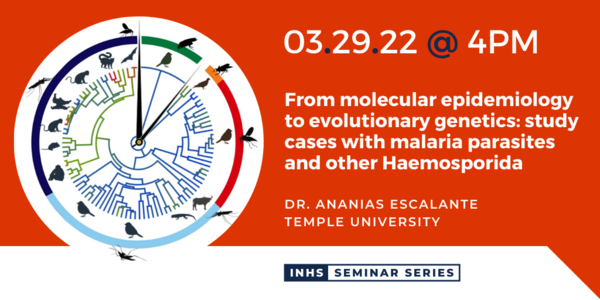
INHS Seminar - From molecular epidemiology to evolutionary genetics: study cases with malaria parasites and other Haemosporida
- Event Type
- Seminar/Symposium
- Sponsor
- Illinois Natural History Survey Seminar Committee
- Virtual
- Join online
- Date
- Mar 29, 2022 4:00 pm
- Speaker
- Dr. Ananias Escalante, Temple University
- Contact
- Evan London
- elondon2@illinois.edu
- Views
- 108
- Originating Calendar
- INHS Events
Join Zoom: https://illinois.zoom.us/j/81224107816?pwd=eCtlak9OTFBPb2FBKzhWTGRvYktXZz09 | Meeting ID: 812 2410 7816 | Password: 351777
Abstract: Molecular epidemiology in infectious diseases leverages genetic information from the parasite or pathogen to study risk factors and the transmission dynamics that affect the frequency and distribution of cases. However, while the initial use of molecular methods emphasized diagnostics (detection), current investigations have developed new frameworks by incorporating evolutionary genetics. This seminar will discuss several examples using Plasmodium and related parasites (order Haemosporida). These symbionts are vector-borne, involving multiple species of Diptera belonging to different families in various ecological settings. Some of these species cause disease in humans (malaria) or other vertebrates, including birds. Considering the diversity of these parasites, we will discuss primarily parasites found in wildlife, emphasizing parasites found in raptors and other avian hosts. The goal of this seminar is to show how interpreting molecular data, beyond having better detection (diagnostics), allows (1) understanding the effect of interventions on a targeted gene (e.g., mutations associated with drug resistance); (2) assess transmission patterns or how they may have occurred; (3) the discovery and delimitation of new parasite species that may or not relate to disease; and (4) to include parasite diversity as part of ecosystems health to monitor potential effects of global changes. We will provide a few examples of how evolutionary genetics can interpret parasite molecular data.